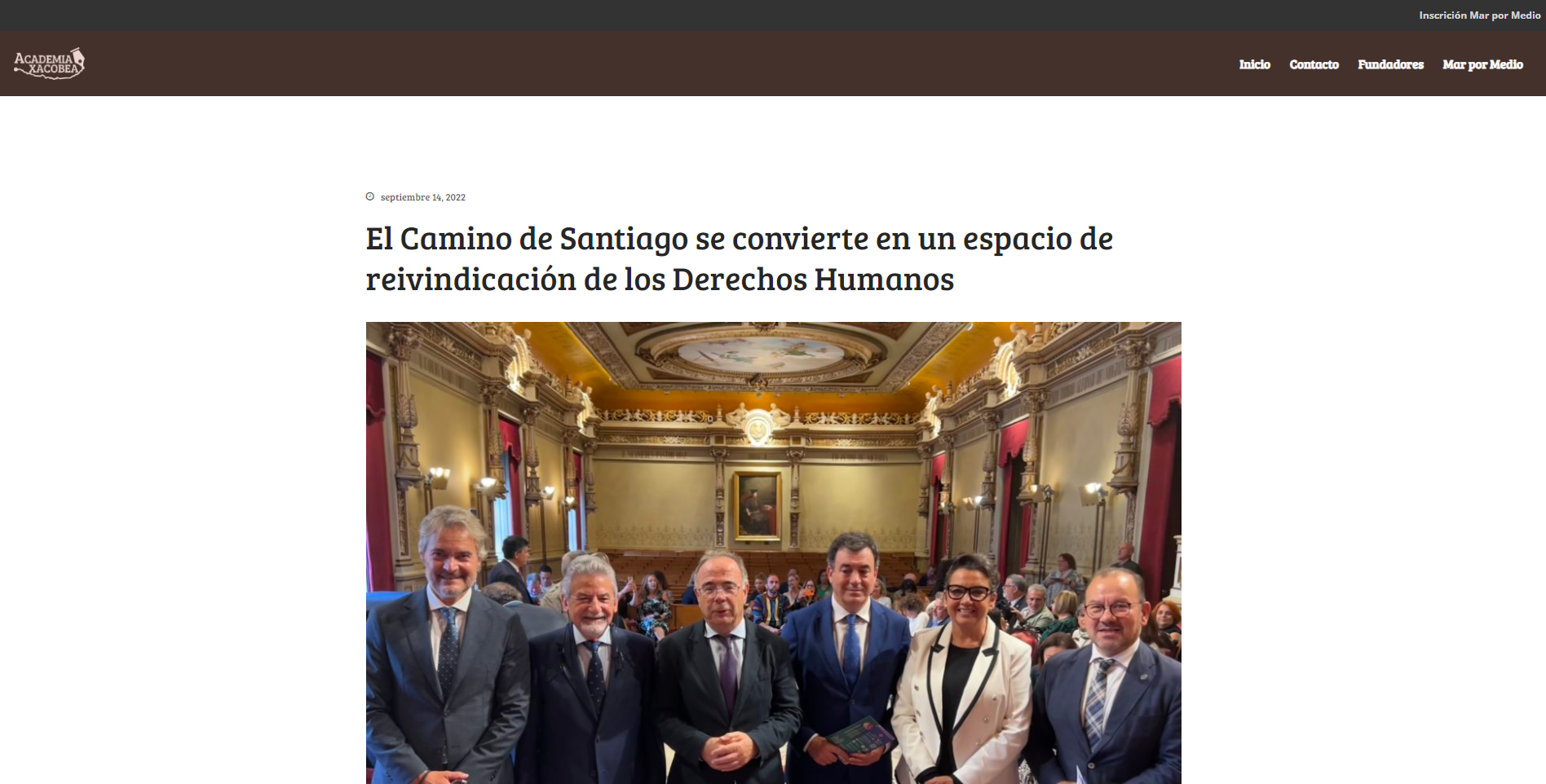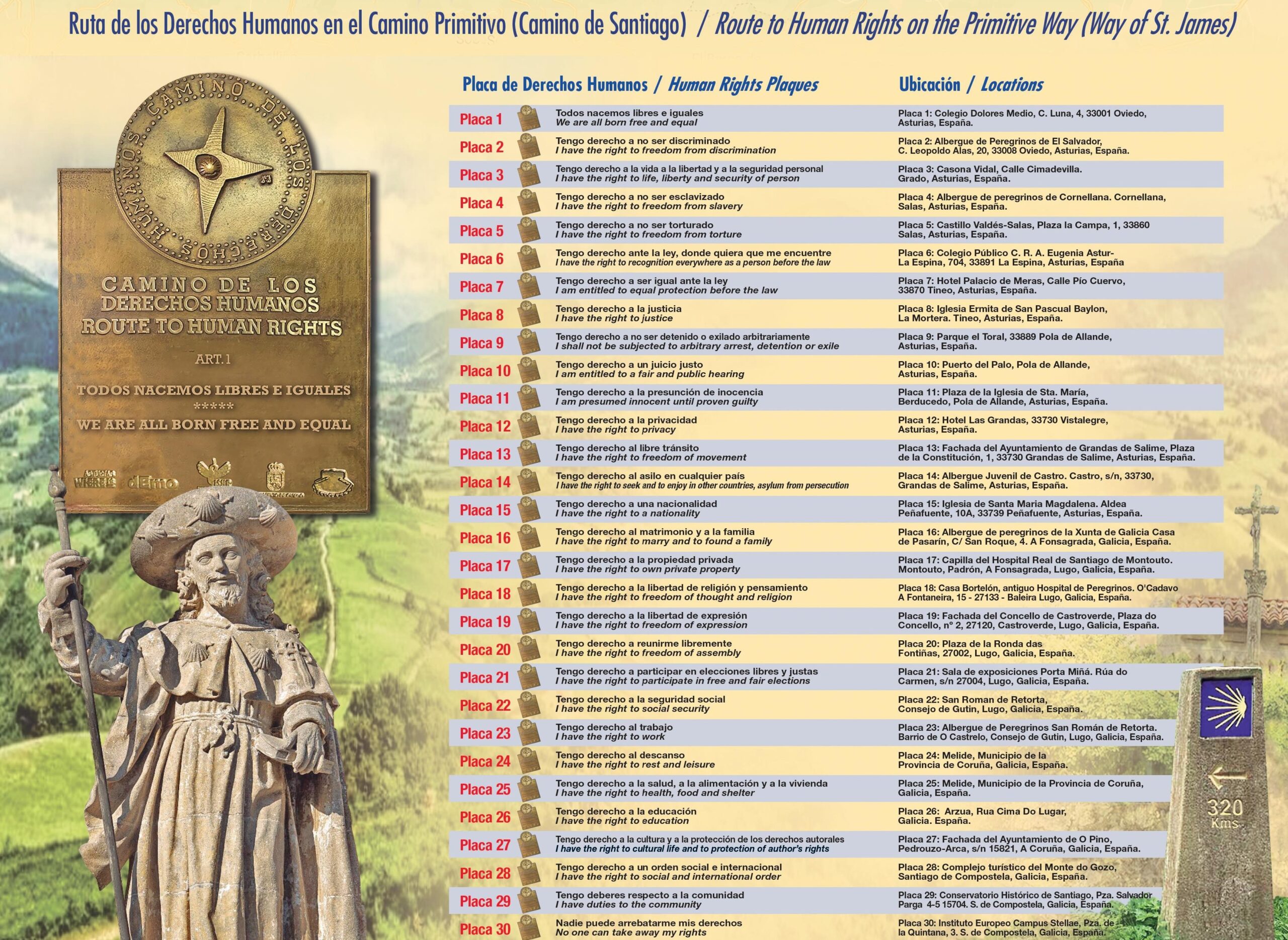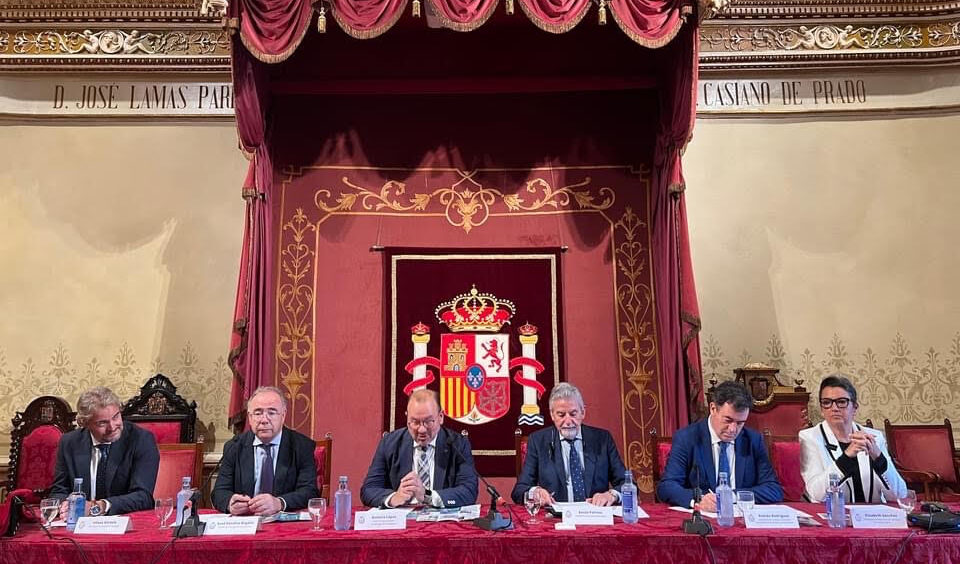
Source: The Jacobean Academy
Translation by: Devorah Sasha
The International Solidarity for Human Rights Foundation presents a commemorative route in Santiago de Compostela that follows the route of the Primitive Way
The Minister of Culture, Román Rodríguez; the rector of the USC, Antonio López, and the mayor of Santiago, Xosé Sánchez Bugallo, have participated in the event organized by the Xacobea Academy
Santiago de Compostela. Wednesday, September 14, 2022. The Camino de Santiago, with its millenary history and its universal scope, has been the space chosen by the International Solidarity for Human Rights foundation to carry out an initiative designed to vindicate the importance and validity of the human rights. Over the last few days, those responsible for this institution and a group of pilgrims from different countries have traveled the Primitive Way, placing 30 commemorative plaques in the different municipalities that it crosses, as many as there are articles in the Universal Declaration of Human Rights adopted by the UN almost 75 years ago. And this afternoon, in Santiago de Compostela, the goal of the Way, together with the Xacobea Academy, they made the official debut of this Way of Human Rights. At the event, held in the USC Paraninfo, the Regional Minister of Culture, Education, Professional Training and Universities, Román Rodríguez; the mayor of Santiago, Xosé Sánchez Bugallo; the rector from Compostela, Antonio López; the president of the Xacobean Academy, Xesús Palmou, the secretary of this entity, Ulises Bértolo, and the president of International Solidarity for Human Rights, Elizabeth Sánchez Vegas.
“The foundation arises from the heart, from the idea of belonging to a Hispanic community, and with the desire to commemorate human rights through the Camino de Santiago” explained Elizabeth Sánchez before expressing her gratitude and that of the institution that presides over “so many people and institutions that have dedicated themselves to making this project a reality”. In addition, she has indicated her intention to work so that this new Human Rights Route becomes a “pleasant, enriching route, with enough rights for the world to channel its existence towards the common good. We appreciate, from the depths of our hearts, the opportunity to be with you and for you, in this mission that humanity sorely needs. We will continue to be part of the escorts that for centuries shelter each traveler on the stellar Camino de Santiago”.
The president of the Xacobea Academy, Xesús Palmou, has congratulated the International Solidarity for Human Rights foundation and its president for this innovative initiative “that links Human Rights and the Camino de Santiago” around freedom, equality, dignity, justice and the common good, as well as the values ”that have flourished and are still present today in the journey to Compostela”: solidarity, fraternity, harmony, peace, universality and shared effort. Palmou has also recalled the crucial role that the pilgrimage has played in shaping European identity, as Goethe said centuries ago and as even included in the Treaty of the European Union in its preamble and has claimed the importance of defending the values of Western culture, such as freedom and equality, against the threats of the post-European world. “Respect for and dissemination of Human Rights constitutes a necessary assumption to preserve and guarantee coexistence and peace among the peoples of the world in the face of anxiety and power struggles, or purely economic interests.”
The secretary of the Xacobean Academy, Ulises Bértolo, has highlighted the importance of the values of the Camino de Santiago and Human Rights in a world like the current one, marked by post-truth, dependence on technology, consumerism and change in the way human interactions occur. “It is because of this uprooting that surrounds us that timeless symbols and references such as Human Rights and the Camino de Santiago are so important that we celebrate today with the inauguration of the route that unites them. In these convulsive times, they represent a horizon in which to recognize ourselves and continue to guide our steps”.
“We have to continue fighting for human rights, to preserve them and to take them to places where they still do not exist”, the rector of the University of Santiago de Compostela, Antonio López, has also pointed out. He has also shown his satisfaction with the fact that the institution he directs has once again collaborated in an act of the Xacobean Academy.
The Minister of Culture, Román Rodríguez, also wanted to emphasize the need to continue working in defense of two human rights because, secondly, he explained, “we are convinced that the economy has always been better, that human rights have always been better. better, and we can be tempted to think that the improvements are irreversible, but if we don’t, we can make a mistake”. The councilor explained that the recognition of these rights constitutes an “anomaly” from the point of view of the history of humanity, because they only have a few decades of life, and he said that, from the geographical point of view, there are many areas of the world where there are not implanted.
This has also been highlighted by the Mayor of Compostela, Xosé Sánchez Bugallo: “It is a general heritage for 15% of the world’s population, but not for the remaining 85%, and there is still a long way to go”. In this sense, he pointed out that on the Camino de Santiago there is dialogue and sharing, which makes it a space of democracy and equality. The interpretation of the Human Rights Anthem “Perfect World” by the singer, in addition of founder and executive director of International Solidarity for Human Rights, Devorah Sasha has put the musical climax to the event held this afternoon.

(Translation in Galician)
O Camiño de Santiago convértese nun espazo de reivindicación dos Dereitos Humanos
A fundación International Solidarity for Human Rights presenta en Santiago de Compostela unha ruta conmemorativa que segue o trazado do Camiño Primitivo
O conselleiro de Cultura, Román Rodríguez, o reitor da USC, Antonio López e o alcalde de Santiago, Xosé Sánchez Bugallo, participaron no acto organizado pola Academia Xacobea
Santiago de Compostela. Mércores, 14 de setembro do 2022. O Camiño de Santiago, coa súa historia milenaria e o seu alcance universal, é o espazo elixido pola fundación International Solidarity for Human Rights para levar a cabo unha iniciativa pensada para reivindicar a importancia e a vixencia dos dereitos humanos. Ao longo dos últimos días, os responsables desta institución e un grupo de peregrinos de diferentes países percorreron o Camiño Primitivo colocando nos distintos municipios que atravesa 30 placas conmemorativas, tantas como artigos ten a Declaración Universal dos Dereitos Humanos adoptada pola ONU hai xa case 75 anos. E esta tarde, en Santiago de Compostela, meta do Camiño, realizaron xunto á Academia Xacobea a posta de longo oficial deste Camiño dos Dereitos Humanos. No acto, celebrado no Paraninfo da USC, tomaron a palabra o conselleiro de Cultura, Educación, Formación Profesional e Universidades, Román Rodríguez; o alcalde de Santiago, Xosé Sánchez Bugallo; o reitor compostelán, Antonio López; o presidente da Academia Xacobea, Xesús Palmou, o secretario desta entidade, Ulises Bértolo, e a presidenta de International Solidarity for Human Rights, Elizabeth Sánchez Veigas.
“A fundación xorde do corazón, da idea de pertenza a unha comunidade hispana, e co afán de conmemorar os dereitos humanos a través do Camiño de Santiago” explicou Elizabeth Sánchez antes de expresar o seu agradecemento e o da institución que preside a “tantas persoas e institucións que se envorcaron en facer deste proxecto unha realidade”. Ademais, sinalou a súa intención de traballar para que esta nova Ruta dos Dereitos Humanos se converta nun “percorrido ameno, enriquecedor, con suficientes dereitos para que o mundo canalice a súa existencia cara ao ben común. Agradecemos, desde o máis profundo dos nosos corazóns, a ventura de estar con vostedes e para vostedes, nesta misión que tanta falta fai á humanidade. Seguiremos sendo parte das escoltas que por séculos abrigan a cada viaxeiro no estelar Camiño de Santiago”.
O presidente da Academia Xacobea, Xesús Palmou, felicitou á fundación International Solidarity for Human Rights e á súa presidenta por esta nova iniciativa “que liga os Dereitos Humanos e o Camiño de Santiago” ao redor da liberdade, a igualdade, a dignidade, a xustiza e o ben común, así como aos valores “que floreceron e hoxe seguen estando presentes no camiñar a Compostela”: a solidariedade, a fraternidade, a concordia, a paz, a universalidade e o esforzo compartido. Palmou lembrou tamén o papel crucial que a peregrinación desempeñou na configuración da identidade europea, tal como dixo Goethe séculos atrás e como recolle mesmo o Tratado da Unión Europea no seu preámbulo, e reivindicou a importancia de defender os valores da cultura occidental, como a liberdade e a igualdade, fronte ás ameazas do mundo posteuropeo. “O respecto e a difusión dos Dereitos Humanos constitúe un presuposto necesario para preservar e garantir a convivencia e a paz entre os pobos do mundo fronte ao ansia e loitas de poder, ou os intereses puramente económicos”.
O secretario da Academia Xacobea, Ulises Bértolo, destacou a importancia dos valores do Camiño de Santiago e dos Dereitos Humanos nun mundo como o actual, marcado pola postverdade, a dependencia da tecnoloxía, o consumismo e o cambio na maneira en que se producen as interaccións humanas. “É por ese desarraigamento que nos rodea polo que son tan importantes os símbolos e referencias atemporais como os Dereitos Humanos e o Camiño de Santiago que hoxe celebramos coa inauguración da ruta que os une. Supoñen nestes tempos convulsos un horizonte no que recoñecernos e seguir guiando os nosos pasos”.
“Temos que seguir loitando polos dereitos humanos, por preservalos e por levalos alá onde aínda non teñen lugar”, apuntou tamén o reitor da Universidade de Santiago de Compostela, Antonio López. Ademais amosou a súa satisfacción polo feito de que a institución que dirixe teña colaborado de novo nun acto da Academia Xacobea.
O conselleiro de Cultura, Román Rodríguez, quixo tamén poñer o énfase na necesidade de seguir traballando na defensa dos dereitos humanos porque segundo explicou, “temos a convicción de que a economía sempre ten ido a mellor, de que os dereitos humanos sempre teñen ido a mellor, e podemos ter a tentación de pensar que as melloras son irreversibles, pero se o facemos podemos caer nun erro”. O conselleiro explicou que o recoñecemento destes dereitos constitúe unha “anomalía” desde o punto de vista da historia da humanidade, pois só teñen unhas poucas décadas de vida, e lembrou que, desde o punto de vista xeográfico, hai moitas zonas do mundo onde aínda non están implantados.
Así o destacou tamén o alcalde compostelán, Xosé Sánchez Bugallo: “É un patrimonio xeneralizado para o 15 % da poboación mundial, pero non así para o 85 % restante, e aínda queda moito camiño por percorrer”. Neste senso, sinalou que no Camiño de Santiago dialógase e compártese, o que o converte nun espazo de democracia e de igualdade.
A interpretación do Himno dos Dereitos Humanos “Perfect World” a cargo da cantante, ademais de fundadora e directora executiva de International Solidarity for Human Rights, Devorah Sasha puxo o colofón musical ao acto celebrado esta tarde.





No comments yet.